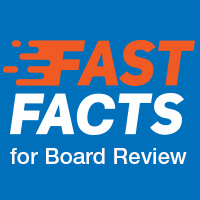User login
1. Which vitamin supplement has shown anticoagulant properties and therefore may lead to postoperative complications in surgical patients?
a. vitamin B1
b. vitamin B12
c. vitamin C
d. vitamin D
e. vitamin E
2. Which of the following anticoagulants is considered a cyclooxygenase inhibitor?
a. aspirin
b. dabigatran etexilate
c. heparin
d. low-molecular-weight heparin
e. warfarin sodium
3. Which of the following coagulation factors is not vitamin K–dependent?
a. factor II
b. factor V
c. factor VII
d. factor IX
e. factor X
4. Which anticoagulant has a potentially serious interaction with proton pump inhibitors?
a. bivalirudin
b. clopidogrel sulfate
c. fish oil
d. heparin
e. warfarin sodium
5. Which of the following anticoagulants is not administered orally?
a. apixaban
b. dabigatran etexilate
c. ticagrelor
d. tinzaparin
e. warfarin sodium
1. Which vitamin supplement has shown anticoagulant properties and therefore may lead to postoperative complications in surgical patients?
a. vitamin B1
b. vitamin B12
c. vitamin C
d. vitamin D
e. vitamin E
2. Which of the following anticoagulants is considered a cyclooxygenase inhibitor?
a. aspirin
b. dabigatran etexilate
c. heparin
d. low-molecular-weight heparin
e. warfarin sodium
3. Which of the following coagulation factors is not vitamin K–dependent?
a. factor II
b. factor V
c. factor VII
d. factor IX
e. factor X
4. Which anticoagulant has a potentially serious interaction with proton pump inhibitors?
a. bivalirudin
b. clopidogrel sulfate
c. fish oil
d. heparin
e. warfarin sodium
5. Which of the following anticoagulants is not administered orally?
a. apixaban
b. dabigatran etexilate
c. ticagrelor
d. tinzaparin
e. warfarin sodium
1. Which vitamin supplement has shown anticoagulant properties and therefore may lead to postoperative complications in surgical patients?
a. vitamin B1
b. vitamin B12
c. vitamin C
d. vitamin D
e. vitamin E
2. Which of the following anticoagulants is considered a cyclooxygenase inhibitor?
a. aspirin
b. dabigatran etexilate
c. heparin
d. low-molecular-weight heparin
e. warfarin sodium
3. Which of the following coagulation factors is not vitamin K–dependent?
a. factor II
b. factor V
c. factor VII
d. factor IX
e. factor X
4. Which anticoagulant has a potentially serious interaction with proton pump inhibitors?
a. bivalirudin
b. clopidogrel sulfate
c. fish oil
d. heparin
e. warfarin sodium
5. Which of the following anticoagulants is not administered orally?
a. apixaban
b. dabigatran etexilate
c. ticagrelor
d. tinzaparin
e. warfarin sodium
